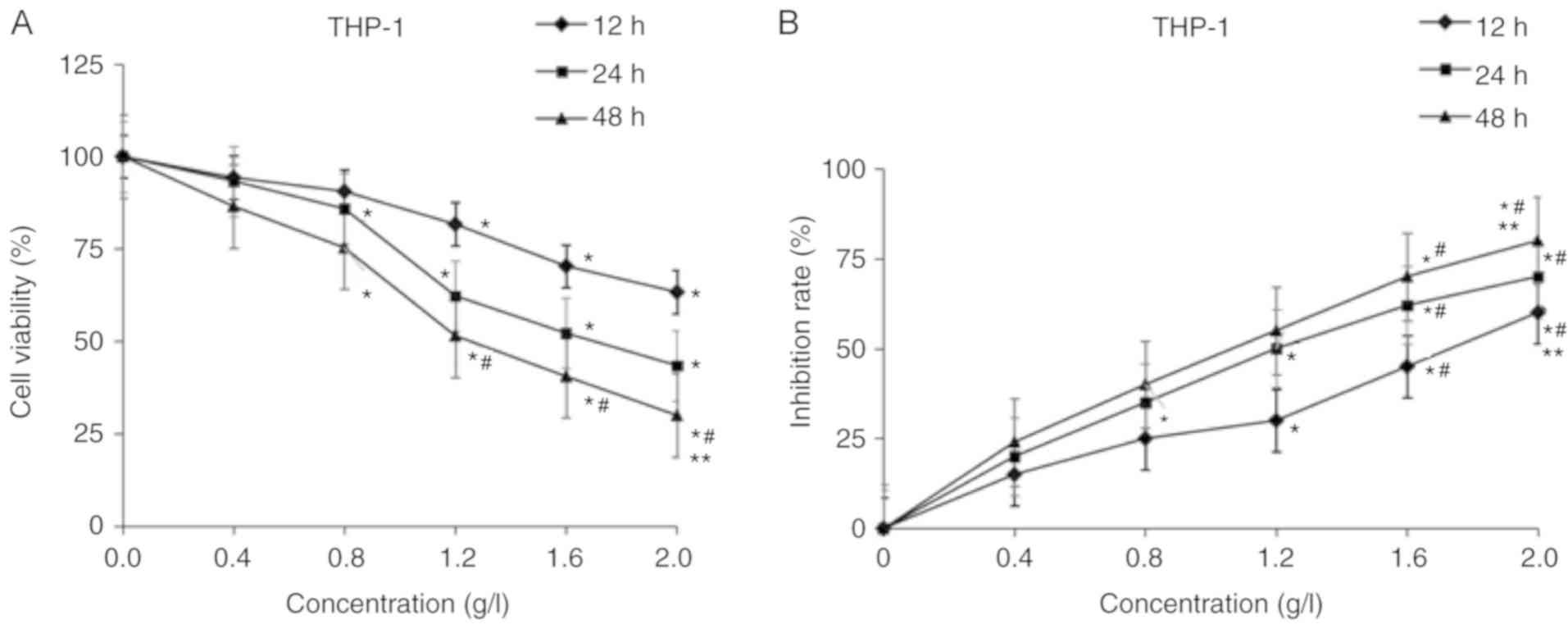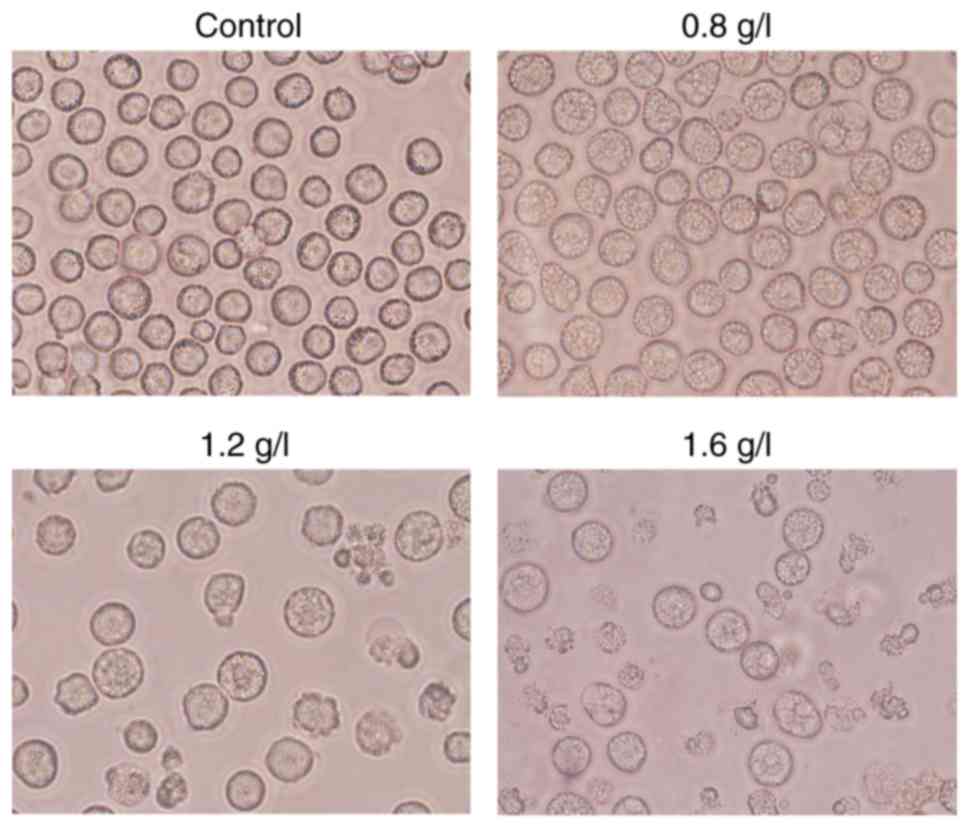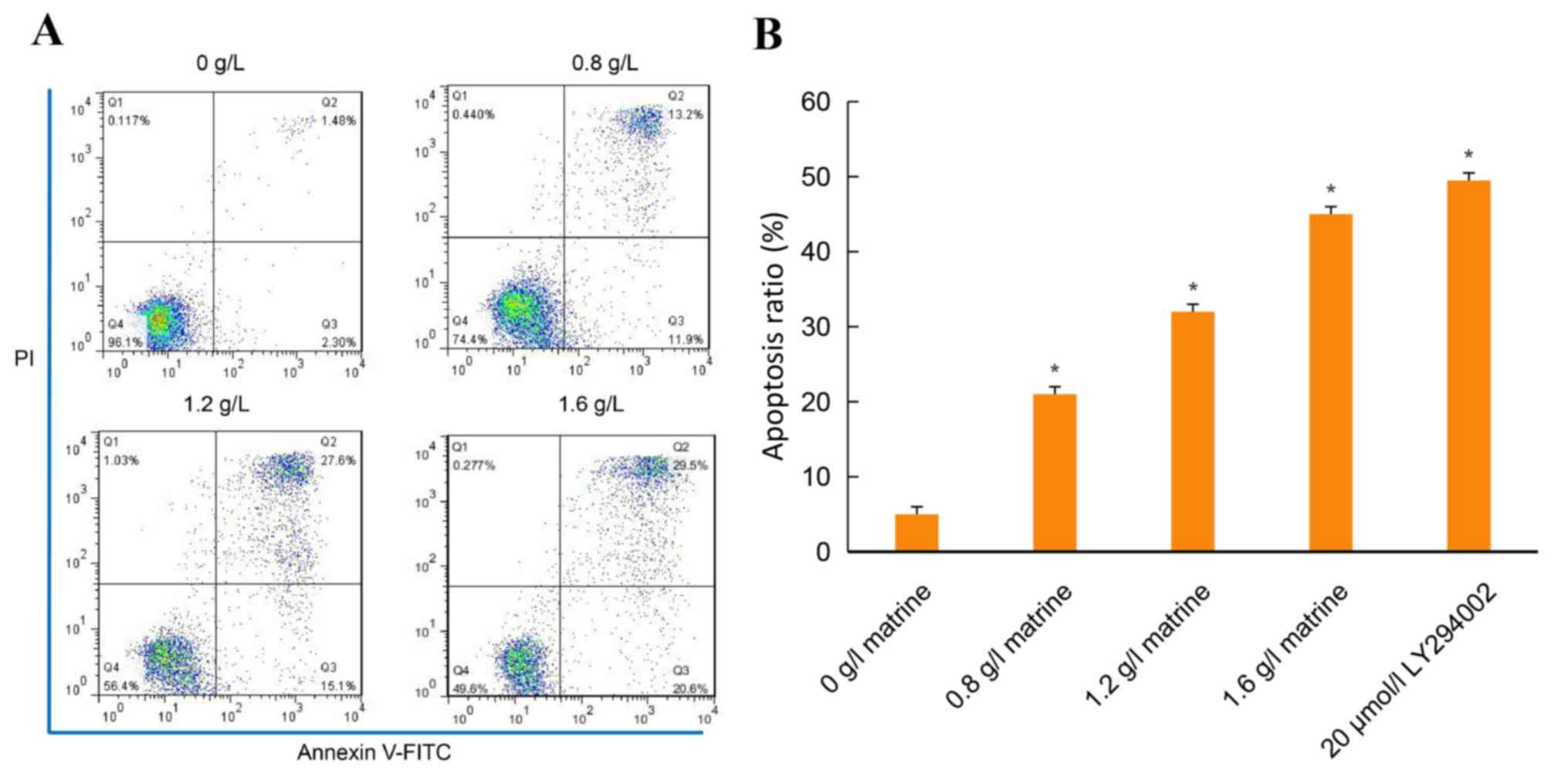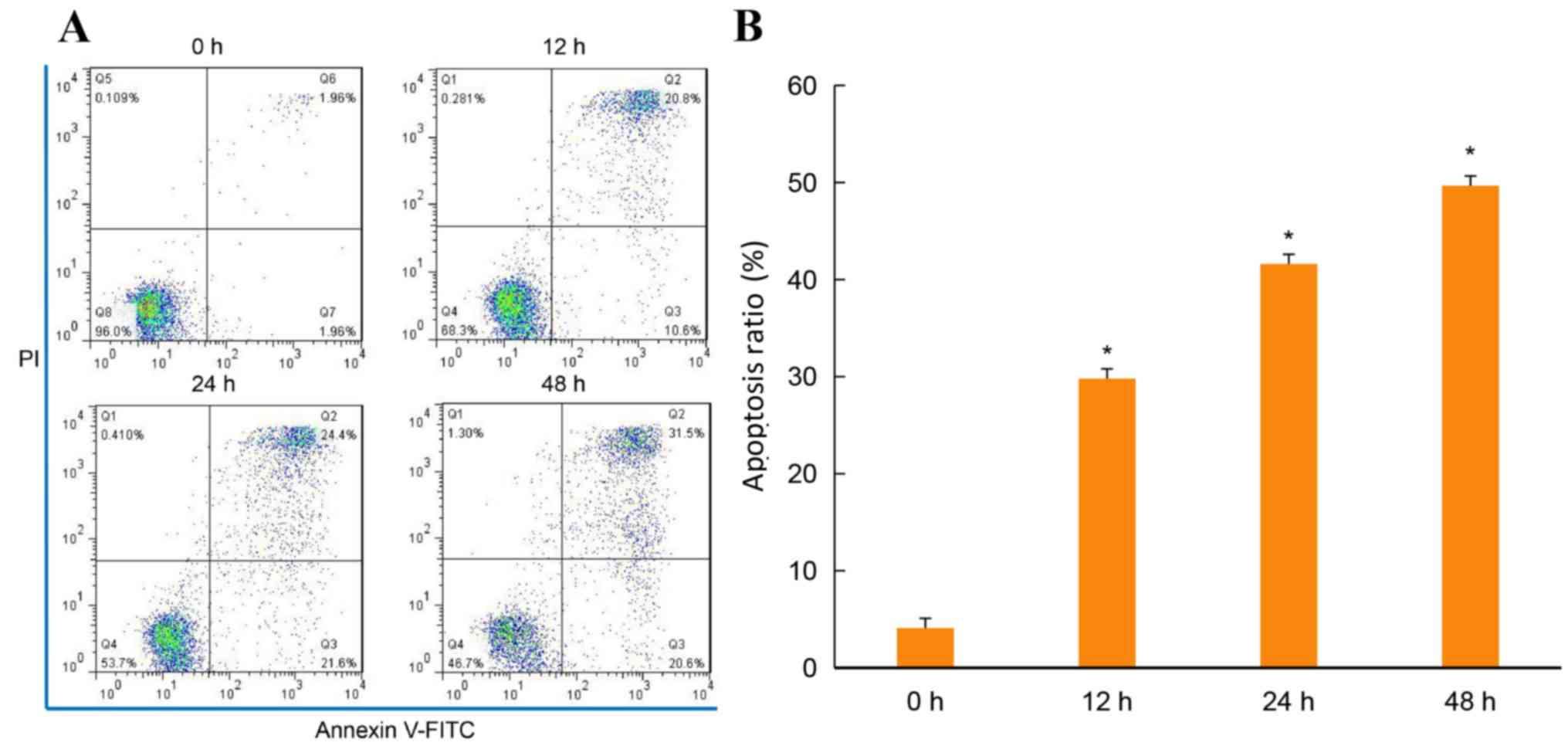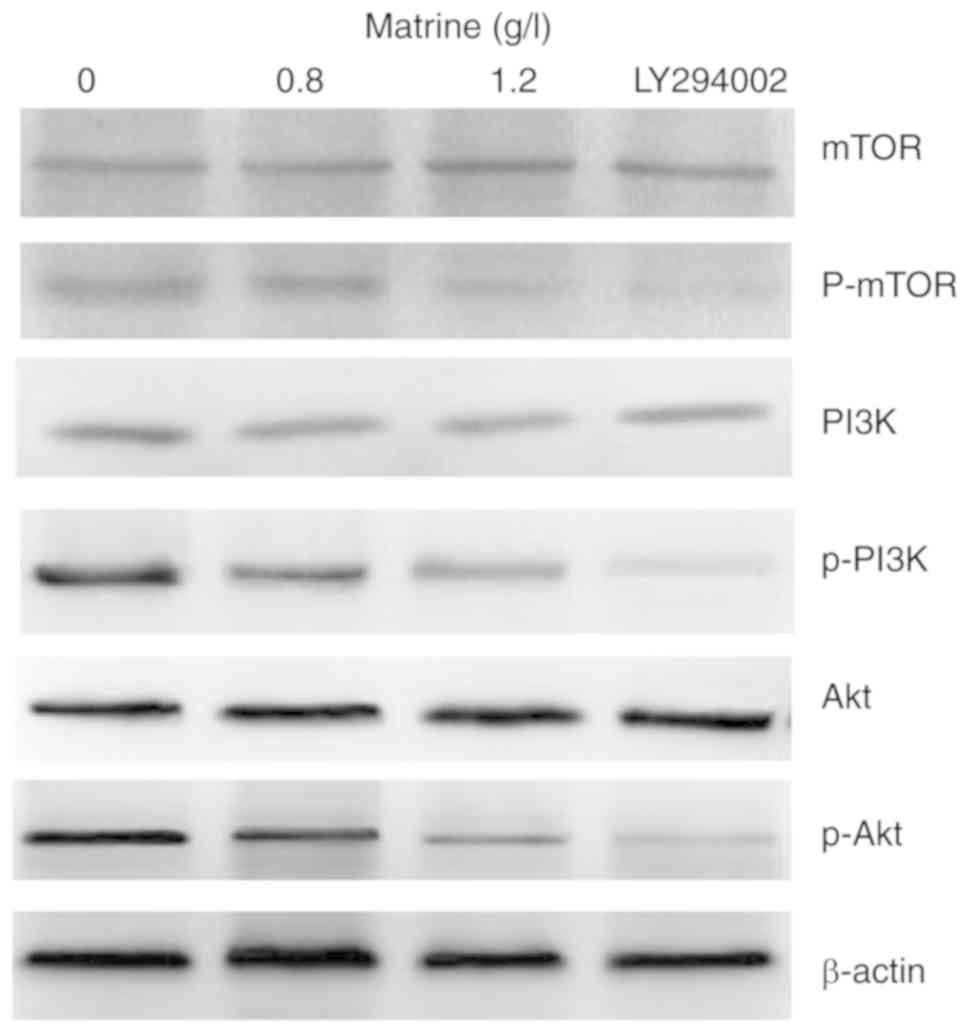|
1
|
Döhner H, Weisdorf DJ and Bloomfield CD:
Acute myeloid leukemia. N Engl J Med. 373:1136–1152. 2015.
View Article : Google Scholar : PubMed/NCBI
|
|
2
|
Estey EH: Therapeutic options for acute
myelogenous leukemia. Cancer. 92:1059–1073. 2001. View Article : Google Scholar : PubMed/NCBI
|
|
3
|
Jabo B, Morgan JW, Martinez ME, Ghamsary M
and Wieduwilt MJ: Sociodemographic disparities in chemotherapy and
hematopoietic cell transplantation utilization among adult acute
lymphoblastic and acute myeloid leukemia patients. PLoS One.
12:e01747602017. View Article : Google Scholar : PubMed/NCBI
|
|
4
|
Kwong YL, Au WY, Chim CS, Pang A, Suen C
and Liang R: Arsenic trioxide- and idarubicin-induced remissions in
relapsed acute promyelocytic leukemia: Clinicopathological and
molecular features of a pilot study. Am J Hematol. 66:274–279.
2001. View
Article : Google Scholar : PubMed/NCBI
|
|
5
|
George B, Mathews V, Vishwabandhya A,
Srivastava A and Chandy ML: Arsenic Trioxide (As2O3) in the
treatment of patients with newly diagnosed acute promyelocytic
leukemia (APML)-Toxicity and outcome. Blood. 104:8892004.PubMed/NCBI
|
|
6
|
Lazo G, Kantarjian H, Estey E, Thomas D,
O'Brien S and Cortes J: Use of arsenic trioxide (As2O3) in the
treatment of patients with acute promyelocytic leukemia: The M. D.
Anderson experience. Cancer. 97:2218–2224. 2003. View Article : Google Scholar : PubMed/NCBI
|
|
7
|
Zhou H, Xu M, Gao Y, Deng Z, Cao H, Zhang
W, Wang Q, Zhang B, Song G, Zhan Y and Hu T: Matrine induces
caspase-independent program cell death in hepatocellular carcinoma
through bid-mediated nuclear translocation of apoptosis inducing
factor. Mol Cancer. 13:592014. View Article : Google Scholar : PubMed/NCBI
|
|
8
|
Zhang Y, Zhang H, Yu P, Liu Q, Liu K, Duan
H, Luan G, Yagasaki K and Zhang G: Effects of matrine against the
growth of human lung cancer and hepatoma cells as well as lung
cancer cell migration. Cytotechnology. 59:191–200. 2009. View Article : Google Scholar : PubMed/NCBI
|
|
9
|
Zhang S, Zhang Y, Zhuang Y, Wang J, Ye J,
Zhang S, Wu J, Yu K and Han Y: Matrine induces apoptosis in human
acute myeloid leukemia cells via the mitochondrial pathway and Akt
inactivation. PLoS One. 7:e468532012. View Article : Google Scholar : PubMed/NCBI
|
|
10
|
Zhang LP, Jiang JK, Tam JW, Zhang Y, Liu
XS, Xu XR, Liu BZ and He YJ: Effects of matrine on proliferation
and differentiation in K-562 cells. Leuk Res. 25:793–800. 2001.
View Article : Google Scholar : PubMed/NCBI
|
|
11
|
Yong-Qing Z, Gao-Sheng H and Hong-Jun L:
Cells differential orientation in K562 cell line with matrine
induction. J Oncol. 10:25–27. 2004.
|
|
12
|
Xu Q, Simpson SE, Scialla TJ, Bagg A and
Carroll M: Survival of acute myeloid leukemia cells requires PI3
kinase activation. Blood. 102:972–980. 2003. View Article : Google Scholar : PubMed/NCBI
|
|
13
|
Kubota Y, Ohnishi H, Kitanaka A, Ishida T
and Tanaka T: Constitutive activation of PI3K is involved in the
spontaneous proliferation of primary acute myeloid leukemia cells:
Direct evidence of PI3K activation. Leukemia. 18:1438–1440. 2004.
View Article : Google Scholar : PubMed/NCBI
|
|
14
|
Dores GM, Devesa SS, Curtis RE, Linet MS
and Morton LM: Acute leukemia incidence and patient survival among
children and adults in the United States, 2001–2007. Blood.
119:342012. View Article : Google Scholar : PubMed/NCBI
|
|
15
|
Krug U, Röllig C, Koschmieder A, Heinecke
A, Sauerland MC, Schaich M, Thiede C, Kramer M, Braess J,
Spiekermann K, et al: Complete remission and early death after
intensive chemotherapy in patients aged 60 years or older with
acute myeloid leukaemia: A web-based application for prediction of
outcomes. Lancet. 376:2000–2008. 2010. View Article : Google Scholar : PubMed/NCBI
|
|
16
|
Gao HY, Li GY, Lou MM, Li XY, Wei XY and
Wang JH: Hepatoprotective effect of Matrine salvianolic acid B salt
on carbon tetrachloride-induced hepatic fibrosis. J Inflamm (Lond).
9:162012. View Article : Google Scholar : PubMed/NCBI
|
|
17
|
Chen JX, Shen HH, Niu M, Guo YM, Liu XQ,
Han YZ, Zhang YM, Zhao YL, Bai BK, Zhou WJ and Xiao XH:
Anti-hepatitis B virus effect of matrine-type alkaloid and
involvement of p38 mitogen-activated protein kinase and tumor
necrosis factor receptor-associated factor 6. Virus Res.
215:104–113. 2016. View Article : Google Scholar : PubMed/NCBI
|
|
18
|
Ma L, Zhu Z, Jiang L, Sun X, Lu X, Zhou M,
Qian S and Li J: Matrine suppresses cell growth of human chronic
myeloid leukemia cells via its inhibition of the
interleukin-6/Janus activated kinase/signal transducer and
activator of transcription 3 signaling cohort. Leuk Lymphoma.
56:2923–2930. 2015. View Article : Google Scholar : PubMed/NCBI
|
|
19
|
Yang Y, Guo JX, Shao ZQ and Gao JP:
Matrine inhibits bladder cancer cell growth and invasion in vitro
through PI3K/AKT signaling pathway: An experimental study. Asian
Pac J Trop Med. 10:515–519. 2017. View Article : Google Scholar : PubMed/NCBI
|
|
20
|
Ishikawa Y: Genetic abnormalities in core
binding factor acute myeloid leukemia. Rinsho Ketsuek (Japanese).
58:991–998. 2017.
|
|
21
|
Illendula A, Pulikkan JA, Zong H,
Grembecka J, Xue L, Sen S, Zhou Y, Boulton A, Kuntimaddi A, Gao Y,
et al: Chemical biology. A small-molecule inhibitor of the aberrant
transcription factor CBFβ-SMMHC delays leukemia in mice. Science.
347:779–784. 2015. View Article : Google Scholar : PubMed/NCBI
|
|
22
|
Morgensztern D and Mcleod HL:
PI3K/Akt/mTOR pathway as a target for cancer therapy. Anticancer
Drugs. 16:797–803. 2005. View Article : Google Scholar : PubMed/NCBI
|
|
23
|
Jin R, Jin YY, Tang YL, Yang HJ, Zhou XQ
and Lei Z: GPNMB silencing suppresses the proliferation and
metastasis of osteosarcoma cells by blocking the PI3K/Akt/mTOR
signaling pathway. Oncol Rep. 39:3034–3040. 2018.PubMed/NCBI
|
|
24
|
Qi L, Sun K, Zhuang Y, Yang J and Chen J:
Study on the association between PI3K/AKT/mTOR signaling pathway
gene polymorphism and susceptibility to gastric cancer. J BUON.
22:1488–1493. 2017.PubMed/NCBI
|
|
25
|
Tamburini J, Elie C, Bardet V, Chapuis N,
Park S, Broët P, Cornillet-Lefebvre P, Lioure B, Ugo V, Blanchet O,
et al: Constitutive phosphoinositide 3-kinase/Akt activation
represents a favorable prognostic factor in de novo acute
myelogenous leukemia patients. Blood. 110:1025–1028. 2007.
View Article : Google Scholar : PubMed/NCBI
|
|
26
|
Park S, Chapuis N, Tamburini J, Bardet V,
Cornilletlefebvre P, Willems L, Green A, Mayeux P, Lacombe C and
Bouscary D: Role of the PI3K/AKT and mTOR signaling pathways in
acute myeloid leukemia. Haematologica. 95:819–828. 2010. View Article : Google Scholar : PubMed/NCBI
|
|
27
|
Wu J, Hu G, Dong Y, Ma R, Yu Z, Jiang S,
Han Y, Yu K and Zhang S: Matrine induces Akt/mTOR signalling
inhibition-mediated autophagy and apoptosis in acute myeloid
leukaemia cells. J Cell Mol Med. 21:1171–1181. 2017. View Article : Google Scholar : PubMed/NCBI
|















